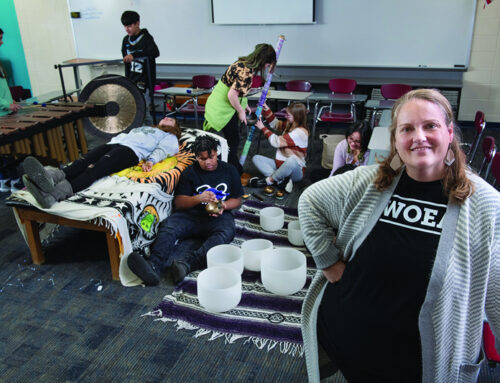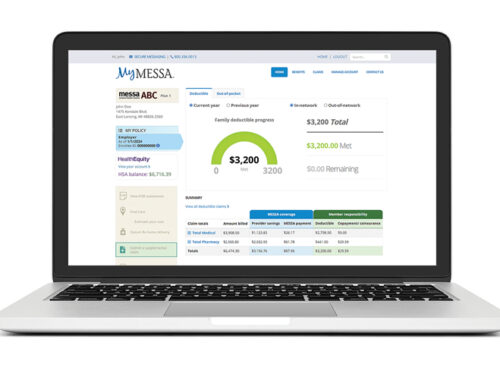“MESSA had my back”
Delton-Kellogg chemistry teacher wins battle with breast cancer
It was a typical cold, snow-filled winter in December 2015 when Connie High noticed an odd lump near the surface of her breast that hadn’t been there before.
“I had an ultrasound and was told that it looked like a cyst,” said High, 50, a chemistry teacher at Delton-Kellogg High School in Delton. Assuming all was well, High went on with life.
“When I went in for an appointment with my gynecologist in the fall, I told him that it was getting bigger,” she said.
High’s gynecologist removed the cyst and sent it into a lab for testing. The next day, he called High and asked her to come into his office right away.
Putting her passion for teaching first, High told her doctor she couldn’t leave school in the middle of the day. She told him she’d be there the next morning at 8.
“I just told him that I knew I must have cancer and that I’m not a fall-apart kind of person,” High said. “I remember thinking ‘OK, we have to get after this.’”
Connie's story
 Watch MESSA member Connie High talk about her battle with cancer and how having a MESSA health plan gave her peace of mind. Find it at messa.cc/ConniesStory or scan the QR code.
Watch MESSA member Connie High talk about her battle with cancer and how having a MESSA health plan gave her peace of mind. Find it at messa.cc/ConniesStory or scan the QR code.The following morning, High braced herself for the inevitable news as she walked into her doctor’s office — she did, in fact, have cancer. The good news: It was detected early.
High and her doctor devised a plan of treatment with a team at the West Michigan Cancer Center.
“I knew that MESSA had my back as I was turned over to a team of people that would treat me for months to come,” High said. “From my surgeon, my oncologist, my radiologist, and the team of people that administered treatment, they made sure that all procedures were approved and set me on the course I needed to recover.”
Breast cancer is the second most-common cancer among American women. Although rare, men can get breast cancer, too. In 2019, there were more than 264,000 new cases of breast cancer reported among women in the U.S., according to the Centers for Disease Control and Prevention. That same year, 42,280 women died from breast cancer.
“All breast complaints need to be taken seriously with an appropriate clinical breast exam and procedures that may include diagnostic mammography or targeted breast ultrasound,” said Dr. David Weismantel, MESSA’s medical director. “Screening mammograms remain an important tool in finding early breast cancer for those without symptoms.”
All MESSA plans cover free cancer screenings including mammograms when members go to an in-network provider. Mammograms are the best way to find breast cancer early. If discovered early, the survival rate for breast cancer is 99%. Early detection includes doing monthly breast self-exams and scheduling regular clinical breast exams and mammograms.
During her fight, High had three surgeries. After the last surgery, she endured five weeks of radiation treatment. High drove 30 minutes one way every day for treatment arriving at 7 a.m. She then headed out the door at 7:15 a.m., drove 30 minutes to school and arrived before the first bell rang at 8 a.m.
The last week of treatment was particularly grueling because she underwent intense radiation exposure that made her tired and caused painful skin burns.
She powered through it all, missing little time in the classroom.
“Teaching takes your mind off all of that,” said High, who only missed work on her surgery days. “Teaching was normal, and I really needed that. The kids and the staff were just great.”
She needed her husband, John, her two sons, Connor and Derek, and her step children, Amy and Harvey, too. She credits them with giving her positive energy.

Months after her last round of radiation, High held a summer program for high school students in which they tested a local lake for E. coli. The group discovered high levels of E. coli in the lake and, after alerting the Barry- Eaton District Health Department, the beach was closed until it was declared safe to reopen.
“I am in awe of Connie,” said MESSA Field Representative Tara Wilbur. “You would never have known she was going through that trying time. She does so much for her students and her community. They are fortunate to have her.”
After five years of clear MRIs and mammograms, High was officially declared cancer free in 2021. She encourages women to routinely perform self-examinations. She credits MESSA for covering all of her treatments, allowing her to focus on her health and giving her peace of mind.
“MESSA allowed me to not worry about my coverage. I could not have afforded treatment on my own. It would have bankrupted me,” High said.






